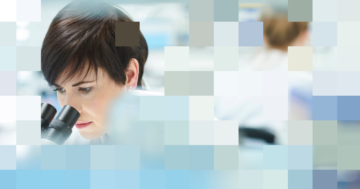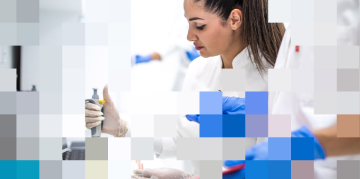Individualised training programmes
The training programmes are individualised and adapted to the expectations of learners, accompanying them throughout their learning process, and boosting their employability and integration into the professional bioproduction sector.
Immerscio.bio allows learners to take a training programme that is appropriate to their level, whether they are beginners, in the mid-range or experts.
Contents of a training programme
Each course consists of several interactive, immersive learning modules that meet specific educational goals. The modules are of different types: digital (e-learning, serious games or virtual reality) and practical (in virtual reality or on the sites of the various partners of Campus Biotech Digital).
Immerscio.bio offers learners the opportunity to personalise and adjust their learning according to their professional needs and objectives.
Range of training programmes on offer
Thirteen courses will be offered by Immerscio.bio to cover the entire spectrum of bioproduction and biotechnology professions, from designing the biomedicine to supplying it to the end client. Immerscio.bio runs training modules ranging from cell culture to purification and from the cold chain to quality control, together with new occupations such as data analyst.
These courses are adapted to the wide variety of learners: students, employees in vocational retraining, employees keen to improve their skills and job seekers.
- Bioproduction Environment
– available - USP (Upstream Process) in cGMP (Good Manufacturing Practices)
– available - Fill & Finish in cGMP
– available - DSP (Downstream Process) in cGMP
– available - Quality Control (QC) in bioproduction
– in progress - Data Integrity in Healthcare industry: all steps up to product batch release
– available - USP & DSP in development
– in progress - Supply chain management – Logistics activities from production to patients
– available
Environment of the BioProduction factory
This curriculum consists of 7 modules: 6 online training modules (e-learning, serious game, virtual reality) and 1 final evaluation module.
The first modules introduce the fundamental concepts of biomanufacturing: the impact of biomanufacturing on biotherapy, the conditions of access to an aseptic industrial environment, and the behaviors to adopt. Learners will put this knowledge to practical use. The following modules explore the more technical aspects of data and digital technologies.
USP (Upstream Process) in cGMPs
This curriculum consists of 7 modules: 6 online training modules (e-learning, serious game, virtual reality) and 1 final evaluation module.
Fill & Finish in cGMPs
This curriculum consists of 11 modules: 10 online training modules (e-learning, serious game, virtual reality) and 1 final evaluation module.
The modules cover topics ranging from raw material handling to final packaging, formulation, sterile filtration, aseptic filling and quality control testing. They also explore applicable current Good Manufacturing Practices (cGMPs) and offer hands-on experience on filling and packaging lines. The curriculum concludes with a final assessment to measure mastery of the skills acquired. This complete training program combines e-learning, virtual reality and serious games. It ensures that participants acquire solid expertise in Fill & Finish for biotherapy.
DSP (Downstream Process) in cGMPS
This curriculum consists of 9 modules: 8 online training modules (e-learning, serious game, virtual reality) and 1 final evaluation module.
Quality Control (QC) in bioproduction
This curriculum consists of 11 modules: 10 online training modules (e-learning, serious game, virtual reality) and 1 final evaluation module.
Initially, the learner will be given an overview of Quality Control in the healthcare sector, and more specifically in biomanufacturing, followed by a more detailed look at the various specialties: microbiology, physicochemistry, immunology, virology, and molecular biology. The different types of test in each of these specialties are explained, using application modules. Learners will then be able to deepen their knowledge of the different pillars of viral safety, efficacy testing and finally the validation of analytical methods, before carrying out the final evaluation test.
Data Integrity in Healthcare industry: all steps up to product batch release
This curriculum consists of 6 modules: 5 online training modules (e-learning, serious game) and 1 final evaluation module.
Supply Chain Management – Logistics activities from production to patients
This curriculum consists of 6 modules: 5 online training modules (e-learning, serious game, virtual reality) and 1 final evaluation module.
This curriculum provides the skills needed to effectively manage the supply chain, from production to distribution, including risk management and process optimization.







